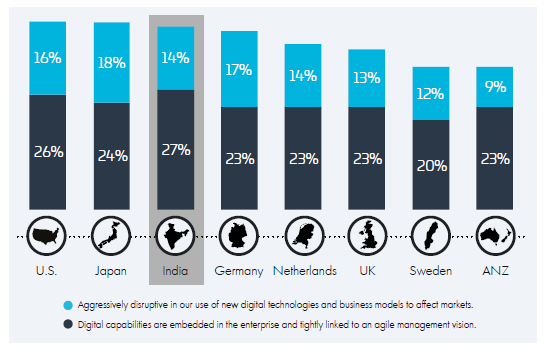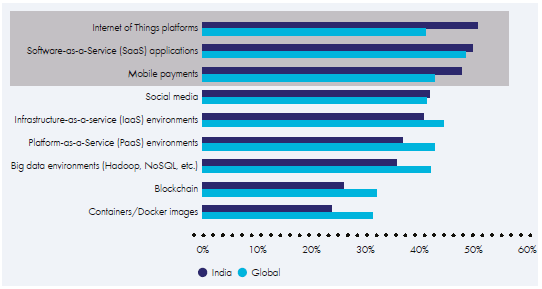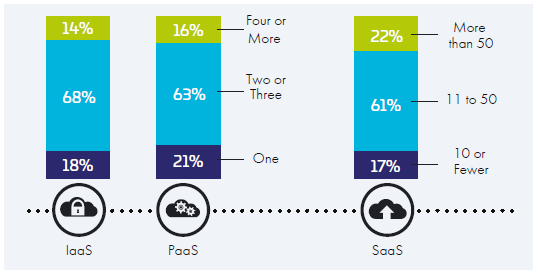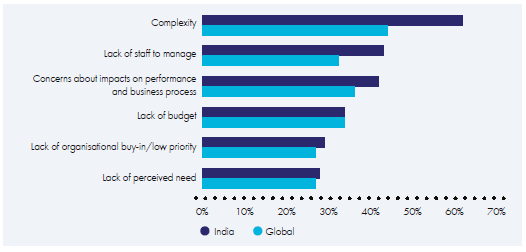Digital transformation is changing the way we live and work, both in India and around the globe. Companies are fundamentally reshaping their businesses and taking advantage of digital technologies like cloud, mobile, social media, and the Internet of Things to transform the experience their customers receive, create innovative new business models, and find ways to realize new efficiencies and reduce their operating costs.
Digital Transformation is Well Underway
According to the 2019 Thales Data Threat Report-India Edition, digital transformation is well underway in India, with 41% of Indian respondents saying they are either aggressively disrupting the markets they participate in or embedding digital capabilities that enable greater organizational agility. Banking, financial services, media, insurance, and e-commerce companies have the lead in transformational initiatives in India. The rate of digital transformation in India is second only to those in the U.S. and Japan and is ahead of the global average of 38%.

While digital transformation is driving benefits to companies and their customers alike, it also introduces new challenges for information security professionals. They must apply security architectures across old infrastructures while simultaneously rolling out new cloud-based, digitally transformative technologies.
To safeguard their digital transformation efforts, Indian companies continue to grow their security spend, with 67% saying spending is up this year. Compared to other regions of the world, growth in security spend in India is strong, as those who say spending is increasing (67%) is well ahead of the global total (50%).
Adopting Clouds for Sensitive Data and Applications
Businesses in India are using cloud platforms and applications as a repository for storing sensitive data. Top among them are Internet of Things platforms, SaaS applications, and mobile platforms. Internet of Things is used more in India than in the global sample, as 51% of the respondents are storing sensitive data in IoT platforms compared to 41% for the global sample. Mobile is another technology that’s showing greater traction in India than the rest of the global sample with 48% of Indian companies storing sensitive data in mobile payment platforms compared to 43% for the global sample.

However, companies need to be aware that using cloud providers does not mean they are not responsible for the security of the data in the cloud. On the contrary. They need to pursue a shared security model between themselves and their cloud providers. While the underlying infrastructure is secured by the PaaS, IaaS, or SaaS provider, companies must take full responsibility for ensuring data protection. Using methods like encryption, tokenization, and masking within their own environments will ensure protection when data moves between SaaS applications or migrates to other applications.
Data Security is a Top Concern for Executives
Data privacy and sovereignty requirements have become the driving factors in adopting data security controls to protect sensitive data and workloads in the cloud worldwide. The same trend is observed in India as well, where 46% of the respondents are encrypting personal data and 14% are using tokenization. Only 11% believe they will not be impacted by data privacy/sovereignty regulations.
Indian respondents recognize the importance of protecting sensitive data, and encrypting data is one of the best ways to do so. Indian businesses use encryption at about 26% for their data at rest (for cloud-native use cases) and 46% for data in transit (for email messages).
Indian firms need to be prepared for the impending Data Protection Bill, a key priority of the IT ministry of the recently elected government. Enterprises doing business in India will need to be prepared to comply with the data privacy and data localization norms which are key pillars of the bill.
The Data Protection Bill, inspired by Europe’s GDPR, includes requirements such as privacy-by-design, data protection impact assessment, appointment of a data protection officer, and requiring consent to process personal and sensitive personal data. These requirements will increase compliance costs for organizations, both local and global.
Complexity is a Barrier to Data Security
Data environments are increasingly complex, and this complexity is proving to be a barrier to data security. Just like in other geographies, Indian companies are moving workloads to multiple cloud environments, even as they work to maintain traditional on-premises infrastructures. Workloads that used to be handled by a single on-premises environment are now being augmented with multiple IaaS and PaaS environments, as well as tens and even hundreds of SaaS applications.

Managing multiple cloud instances introduces new challenges for Indian IT departments. It is hard enough to encrypt, tokenize, and manage access to sensitive data within a single cloud instance, let alone dozens of them. Indian respondents rate complexity, lack of staff to manage, and impacts on business performance as their top concerns over data security, at even greater rates than the global sample. It’s not the lack of importance or organizational buy-in that’s hindering them. Budget concerns are less of a barrier than complexity, personnel, and ensuring performance/business processes.

How Does Thales Help in Facilitating Data Security in Complex Environments?
Businesses in India have embarked on a formidable digital journey that is destined to transform the way they do business and offer services, placing India as a world leader in the IT industry. The biggest challenge they need to face is security complexity. Organizations need to put tools in place that will let them manage complexity. These tools should span both legacy on-premises needs as well as modern, cloud-based and edge-oriented technologies, and be pervasive where needed with encryption and key management solutions.
Thales offers a wide range of cybersecurity and data protection solutions that can help every organization in India or doing business in India to embark successfully on their digital transformation journey while being compliant with the Data Protection Bill.
For more key findings, please download the 2019 Thales Data Threat Report-India Edition.
